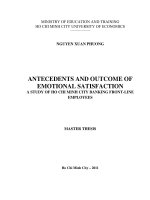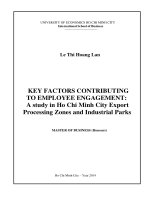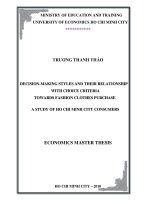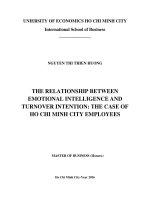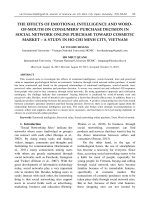Decision making styles and therir relationship with choice criteria towards fashion clothes purchase a study of ho chi minh city consummers
Bạn đang xem bản rút gọn của tài liệu. Xem và tải ngay bản đầy đủ của tài liệu tại đây (1.32 MB, 130 trang )
MINISTRY OF EDUCATION AND TRAINING
UNIVERSITY OF ECONOMICS HO CHI MINH CITY
***********
TRƯƠNG THANH THẢO
DECISION-MAKING STYLES AND THEIR RELATIONSHIP
WITH CHOICE CRITERIA
TOWARDS FASHION CLOTHES PURCHASE
A STUDY OF HO CHI MINH CITY CONSUMERS
ECONOMICS MASTER THESIS
HO CHI MINH CITY – 2010
2
MINISTRY OF EDUCATION AND TRAINING
UNIVERSITY OF ECONOMICS HO CHI MINH CITY
***********
TRƯƠNG THANH THẢO
DECISION-MAKING STYLES AND THEIR RELATIONSHIP
WITH CHOICE CRITERIA
TOWARDS FASHION CLOTHES PURCHASE
A STUDY OF HO CHI MINH CITY CONSUMERS
ECONOMICS MASTER THESIS
Major: Business Administration
Major code: 60.34.05
Academic Supervisor: Dr. Trần Hà Minh Quân
Ho Chi Minh City - 2010
3
Acknowledgement
********
I would like to express my heartfelt gratitude and deepest appreciation to my
academic research supervisor, Dr. Tran Ha Minh Quan for his precious guidance,
share of experiences, ceaseless encouragements and highly valuable suggestions
during the research.
I would also like to express my appreciation to Professor Nguyen Dong Phong
and UEH Board of Directors for creating MBA program in English.
In addition, I would like to thank all the teachers in the Economics University,
Ho Chi Minh City, especially faculty of Business Administration and Postgraduate
Faculty, who have taught me a lot about marketing and management knowledge in the
past three years, for their suggestions and supports for this research.
I also would like to express my gratitude to my classmates in MBA classes,
Batch 16, especially Mr. Phong, Mr. Trung, Mr. Phuc (Faculty of Business
Administration), all my friends in Batch 18, 19 for their share of knowledge,
experience and their enthusiastic support in conducting survey for this research.
I would like to express my sincere thanks to my dearest friends for squeezing
lots of time for helping me in conducting survey, share of knowledge and information
for this research.
Finally yet importantly, I would like to thank my family members who always
gave me supports and encouraged me when I had difficulties in doing the research.
Trương Thanh Thảo
4
ABSTRACT
*******
This research explores the decision-making styles of consumers in Ho Chi
Minh City, tests the differences in these styles among gender, age, monthly income
groups. Specifically, it offers empirical results on the relationship between consumer
decision-making styles and choice criteria towards fashion clothes purchase. The
Consumer Style Inventory (CSI), developed by Sproles and Kendall (1986) for
examining different consumer decision-making styles, is adapted in this research. A
survey by questionnaire is employed as the tool to collect primary data and the
research instrument is administered to 490 young consumers in Ho Chi Minh City,
410 are identified to be valid for the research.
The research results find that eight factors representing the decision-making
styles regarding fashion clothes purchase of
Ho Chi Minh City consumers are
“Brand and “Price equals Quality” consciousness”, “Fashion and Novelty
consciousness”, “Perfection and High Quality consciousness”, “Impulsiveness
and Carelessness”, “Confusion by Overchoice”, ‘Habit and Brand Loyalty”,
“Price and “Value for Money” consciousness” and “Recreational and Hedonic
consciousness”.
Five factors representing clothes choice criteria including “product and quality
related criteria”, “store and salesperson related criteria”, “style and design
related criteria”, “brand and image related criteria” and “price related criteria”
are found to positively or negatively correlate with 6 decision-making styles such as
“Brand and “Price equals Quality” consciousness”, “Fashion and Novelty
consciousness”, “Perfection and High Quality consciousness”, “Habit and Brand
Loyalty”, “Price and “Value for Money” consciousness and “Recreational and
Hedonic consciousness”.
The testing results show that there are differences in Ho Chi Minh City
consumer decision-making styles among gender, age, monthly income groups.
Keywords: decision-making style, consumer style inventory, fashion clothes.
5
TABLE OF CONTENTS
**********
Acknowledgement ...................................................................................................... i
Abstract...................................................................................................................... ii
TABLE OF CONTENTS .......................................................................................... iii
ABBREVIATIONS.................................................................................................... v
LIST OF FIGURES................................................................................................... vi
LIST OF TABLES ................................................................................................... vii
Chapter 1: INTRODUCTION................................................................................. 1
1.1 . Research introduction ......................................................................................... 2
1.2 . Research rationale............................................................................................... 3
1.3 . Research objectives............................................................................................. 5
1.4 . Scope of the research .......................................................................................... 5
1.5 . Research method and process.............................................................................. 5
1.6 . Theoretical and practical implications of the research ......................................... 8
1.7 . Structure of the research...................................................................................... 9
Chapter 2: LITERATURE REVIEW ................................................................... 11
2.1. Consumer decision – making styles................................................................. 12
2.2. Clothes choice criteria..................................................................................... 17
2.3. Some main characteristics of fashion clothes market and consumers
in Ho Chi Minh City....................................................................................... 19
2.4. The research model ......................................................................................... 21
2.5. Research hypothesis ........................................................................................ 21
2.6. Measurement scale.......................................................................................... 22
Chapter 3: RESEARCH DESIGN......................................................................... 24
3.1.
3.1.1.
3.1.2.
3.2.
3.2.1.
3.2.2.
3.2.3.
3.2.4.
Preliminary research...................................................................................... 25
Stages in the preliminary research ................................................................. 25
The preliminary research outcome................................................................. 25
Official research ............................................................................................ 30
The questionnaire .......................................................................................... 30
Sample size ................................................................................................... 30
Sampling method........................................................................................... 31
Data analysis method..................................................................................... 31
6
Chapter 4: DATA ANALYSIS AND FINDINGS ................................................ 33
4.1. Characteristics of sample................................................................................ 34
4.1.1. Descriptions of sample ................................................................................... 34
4.1.2. Characteristics of sample................................................................................ 34
4.2. Descriptive statistics ....................................................................................... 35
4.2.1. Descriptive statistics for variables of decision-making styles .......................... 35
4.2.2. Descriptive statistics for variables of clothes choice criteria ........................... 37
4.3. Exploratory factor analysis ............................................................................. 38
4.3.1. Exploratory factor analysis for decision-making styles ................................... 39
4.3.2. Exploratory factor analysis for clothes choice criteria..................................... 42
4.4. Scales reliability analysis................................................................................ 44
4.4.1. Scales reliability analysis for decision-making styles...................................... 45
4.4.2. Scales reliability analysis for clothes choice criteria ....................................... 47
4.5. Testing the differences in decision-making styles among gender, age,
monthly income groups ................................................................................. 49
4.5.1. Testing the differences in decision-making styles among gender groups......... 49
4.5.2. Testing the differences in decision-making styles among age groups.............. 50
4.5.3. Testing the differences in decision-making styles among income groups........ 50
4.6. Multiple regression analysis ........................................................................... 52
4.6.1. Correlation analysis ........................................................................................ 52
4.6.2. Multiple regression analysis ........................................................................... 54
4.7. Conclusion ..................................................................................................... 67
Chapter 5: CONCLUSIONS AND IMPLICATIONS .......................................... 69
5.1. Summary of the research ................................................................................ 70
5.2. Implications of the research............................................................................ 72
5.2.1. Theoretical implications ................................................................................. 72
5.2.2. Practical implications .................................................................................... 72
5.3. Limitations and recommendations for further research ................................... 78
5.4. Conclusion ..................................................................................................... 78
References
Appendix 1 – Questions for “face to face” discussion ................................................ 1
Appendix 2 – Questionnaire (Vietnamese version)..................................................... 2
Appendix 3 – Sample characteristics .......................................................................... 5
Appendix 4 – Exploratory Factor Analysis Results..................................................... 7
Appendix 5 – Scale Reliability Analysis Results ...................................................... 14
Appendix 6 – t-test and ANOVA test results ............................................................ 19
Appendix 7 – Multiple regression analysis results .................................................... 32
Appendix 8 – Graphs for testing linear regression hypothesis................................... 36
…..…….***………..
7
ABBREVIATIONS
********
CSI: Consumer Style Inventory
EFA: exploratory factor analysis
HCMC : Ho Chi Minh City
m: million
VND: Viet Nam Dong
WTO: World Trade Organization
8
LIST OF FIGURES
********
Figure 1.1. The research process ........................................................................ 7
Figure 1.2. Structure of the research................................................................... 9
Figure 2.1. The research model ...................................................................... 21
Figure 3.1. Stages in preliminary research ........................................................ 25
Figure 4.1. The result of research model........................................................... 67
9
LIST OF TABLES
********
Table 2.1: Summary of findings from 21 studies of clothes choice criteria...............................18
Table 2.2: 40 items of Consumer Style Inventory ....................................................................22
Table 3.1: Variables for measuring decision-making styles......................................................26
Table 3.2: Variables for measuring clothes choice criteria .......................................................29
Table 4.1: Characteristics of sample ........................................................................................34
Table 4.2: Descriptive statistics for variables of decision-making styles ..................................35
Table 4.3: Descriptive statistics for variables of clothes choice criteria ....................................37
Table 4.4 – Rotated component matrix of decision – making styles ...........................................39
Table 4.5 – Rotated component matrix of clothes choice criteria ...............................................43
Table 4.6 – Scale reliability of decision-making styles .............................................................45
Table 4.7 – Scale reliability of clothes choice criteria ................................................................47
Table 4.8– Correlation matrix....................................................................................................53
Table 4.9. Coefficients in multiple regression analysis of Brand style........................................55
Table 4.10. Coefficients in multiple regression analysis of Fashion style ...................................57
Table 4.11. Coefficients in multiple regression analysis of Quality style....................................59
Table 4.12. Coefficients in multiple regression analysis of Habit style.......................................62
Table 4.13. Coefficients in multiple regression analysis of Price style .......................................64
Table 4.14. Coefficients in multiple regression analysis of Recreation style...............................66
Table 4.15. Summary of multiple regression analysis ............................................................. .68
…………………..***…………………
10
CHAPTER 1: INTRODUCTION
This chapter presents general introduction of the current research with which
the research introduction, research rationale, research objectives are provided. An
introduction to the research method to be used, research process and scope of the
research are also addressed in this chapter. At the end of the chapter, the implication
and structure of the research are provided.
11
1.1.
RESEARCH INTRODUCTION
After Vietnam’ entrance into World Trade Organization (WTO), Vietnam
fashion clothes market in general and Ho Chi Minh City clothes market in particular
have developed more strongly. A lot of foreign brands and retailers have come into
local market and expanded their businesses such as Gucci, Lacoste, Thump, Tommy,
Guess, Calvin Klein, Bossini, John Herry, Nike, Valentino, Esprit, Giordano, Kappa
… Moreover, there are more and more department stores, trade and shopping centers,
specialty stores…selling a wide range of fashion clothes products, especially foreign
brands in more professional way of selling such as Diamond Plaza, Parkson Plaza, Jen
Plaza, Sai Gon Center, Saigon Paragon, Vincom center…These are places selling
many foreign and local brands with diversified and fashionable styles and designs,
high quality and with different prices. These have attracted the attention and interest of
consumers and open up abundant choices for them…The increase in number of
foreign brands and retailers as well as their sales promotion programs and events have
contributed to create the dynamic and tenser competition in the market.
Regarding Ho Chi Minh City consumers, when their income increases, their
requirements for fashion clothes are also stricter in terms of product quality, brand
name, style as well as fashionableness,...Consumers are provided with more choices
from local to foreign famous brands. They are also provided with more product
information in magazines, on advertisements, on television and especially on the
internet,...These have contributed to make their buying decision-making more
complex. In addition, local fashion clothes companies face more challenges as they
have to compete with more and more foreign strong brands. The question is raised
about how local clothes companies can strengthen their firm position in the market,
maintain and expand market share, keep trust and loyalty of consumers.
12
According to George E.Belch1, before a marketing campaign, it is very important
that businesses have to know about their target consumers, particularly what their
needs are, how they think and decide when buying different products. Purchase
decision – making is one of the most important issues of research on consumer
behavior as it relates directly to the product sales.
Also according to Hafstrom, Chae and Chung (1992), decision-making is more
complex and even more important for consumers today than in the past. Consumers
are besieged by advertisements, news articles, and direct mailings that provide an
abundance of information. In addition, increases in the number and variety of goods,
stores, and shopping centers and online purchasing capabilities have broadened the
sphere for consumers’ choice and have complicated their decision-making.
In front of tenser competition in the market, clothes companies and marketers
need to know more about consumer buying behaviour, especially decision-making
behaviour as well as their critical choice criteria in clothes buying. Having a deep and
comprehensive understanding about target consumers will assist them to compete
more efficiently and successfully in the market.
1.2. RESEARCH RATIONALE
In view of keener competition in the future clothes market in Vietnam and
o
especially in Ho Chi Minh City, it is very important that clothes companies,
marketers,…need to have a deeper and more comprehensive understanding about
consumer buying behaviour, especially consumer buying decision-making but
researches on this issue in Vietnam are still limited. After studying many different
theories on consumer decision-making, this research will employ the widely used USbased scale, Consumer Style Inventory (CSI) developed by Sproles and Kendall in
1986 to identify Ho Chi Minh City consumer decision-making styles
1
(Advertising and promotion: an integrated marketing communication perspective, E.Belch,
1997)
13
towards fashion clothes purchase. The use of Consumer Style Inventory (CSI) for
identifying consumer decision – making styles in fashion clothes industry has been
made in previous researches in some countries.
o
Research into choice criteria also helps marketers understand more about
consumer buying decision-making. According to Sproles (1979), different criteria may
have varied importance in every consumer’s mind and consumers would assign high
importance on the criteria that can really reflect their underlying characteristics and
experiences. Besides, the critical characteristics or attributes of clothes products can
always determine its ultimate purchase acceptance or rejection by consumers, the
criteria that consumers use in clothes purchase decisions are often postulated by
researchers as important factors to be considered in the investigation of consumers’
clothes buying behaviour.
o
In Wickliffe’s (1998) study, the author concluded that consumer decision-
making styles have been found to be highly correlated with some product
characteristics (e.g. price, country of origin, brand name,…). In Kwan C.Y Yeung
K.W and Au K.F (2004) study on the relationship between decision-making styles and
clothes choice criteria in China, they also found that the consumer decision-making
styles have relationship with clothes choice criteria.
o
Based on previous researches and in order to understand more about consumer
buying behaviour, this research also investigates the relationship between decisionmaking styles and clothes choice criteria.
o
It is hoped that by identifying the decision-making styles and the relationship
between these styles and choice criteria towards fashion clothes purchase of Ho Chi
Minh City consumers, this research will help clothes companies,
marketers,
retailers… have a deeper and more comprehensive understanding of buying
characteristics of their target customers and to further sustain their competitiveness in
the marketplace.
14
1.3.
RESEARCH OBJECTIVES
The research is done to provide answers to the above issues, based on which the
implications are suggested. In particular, the objectives of this research are:
a. To identify the decision-making styles of consumers in HCMC towards fashion
clothes purchase.
b. To find whether there are differences in these decision-making styles among
different gender, age and income groups.
c. To investigate the relationship between consumer decision-making styles and
clothes choice criteria.
d. To provide implications for fashion clothes companies, marketers,…in Ho Chi
Minh City
1.4.
SCOPE OF THE RESEARCH
The research focuses mainly on identifying the decision-making styles of the
consumers in HCMC, testing the differences in decision-making styles among gender,
age and income groups and then investigating the relationship of these styles with
clothes choice criteria.
This study focuses on young individual consumers from 18 to 40 years old in Ho
Chi Minh City.
Fashion clothes: is defined to all clothes with clear brand and origin, be legally
manufactured and traded in Vietnam
1.5. RESEARCH METHOD AND PROCESS
The research is divided into 2 stages: the preliminary research using qualitative
method and official research using quantitative method.
Stage 1: Preliminary research
15
Preliminary research is made using qualitative method. “Face to face” discussion
method is used. The interviewees are typical consumers. The research aims at adjusting
measurement scales to be suitable with conditions in Vietnam.
Stage 2: Official research
Official research is made using quantitative method, using direct interview
method by questionnaire. Convenient sampling is used in this survey. Interviewees are
consumers in Ho Chi Minh City.
The official questionnaire is formed through stages from draft questionnaire to
official questionnaire after “face to face” discussion.
-
Using SPSS software 16.0 for descriptive statistics, exploratory factor analysis,
scale reliability analysis, t-test, ANOVA test, multiple regression analysis. The
research process is described below:
16
Decision - making styles and
their relationship with
choice criteria towards
fashion clothes purchase
Literature review
Research model
Draft
questionnaire
“Face to face” discussion
Pilot interview
Official
questionnaire
Official survey
Exploratory factor analysis
Scale reliability analysis
Adjusting the
research model
t- Test, ANOVA test
Multiple regression analysis
Conclusion and
implication
Figure 1.1: Research process
17
1.6.
THEORETICAL
AND
PRACTICAL
IMPLICATIONS
OF
THE
RESEARCH
Consumer decision-making is of great interest for marketers, retailers and
consumer researchers,...interested in serving the consumer (Canabal, 2002).
This study attempts to identify the decision-making styles of consumers in Ho
Chi Minh City. It brings various practical meanings to policy-makers,
clothes
companies, managers, marketers, retailers,… doing business in the fashion clothes
industry in Ho Chi Minh City, particularly:
o
Firstly, the results of the research aid the clothes companies and marketers to
more deeply understand about the decision-making styles and clothes choice criteria of
consumers in the context of tenser competition in the market, which resulting in their
profound knowledge in designing appropriate marketing programs for building and
developing brand name, improving product quality, increasing market share, turnover
and profit…
o
Moreover, understanding consumer decision-making styles, the differences in
decision-making styles among gender, age, and income groups is vital for clothes
companies and marketers, retailers in gaining valuable information that they can use
for market segmentation, facilitating product positioning and decision - making of
marketing mix,... in order to more satisfy their target consumers.
o
The research results can be used by policy-makers, researchers in orienting
consumer behaviour, making policies to develop fashion clothes industry and the
related areas.
o
The result of the research contributes complementarily to the literature on
consumer decision-making styles in Vietnam. The research result will be the basis for
further researches on consumer decision-making styles and be a reference for
researchers, lecturers and students in studying consumer behaviour in Vietnam and in
the world.
18
o
The research results help the author understand more deeply about literature on
consumer decision-making, provide basic knowledge for further research in this area
and the related areas.
1.7.
STRUCTURE OF THE RESEARCH
The research paper is arranged into 5 chapters. Chapter 1 introduces the
research introduction, research rationale, research objectives, scope of the research,
research method and process as well as implication and structure of the research.
Literature review is presented in chapter 2. Chapter 3 describes the research design.
Research results are presented in chapter 4. Chapter 5 summarizes the research results,
provides implications for policy-makers, manufacturers and marketers, retailers,…in
fashion clothes industry and suggests further researches. The last part is the conclusion
which ties the research together. The structure of this research is shown in figure 1.2.
Chapter 1
Introduction
Chapter 2
Literature review
Chapter 3
Research design
Chapter 4
Data analysis and findings
Chapter 5
Conclusion and implication
Figure 1.2.: Structure of the research
19
In conclusion,
At the end of this chapter, the reader may have an overview of the whole
research: research rationale, research objectives, scope of the research, research
process, research method, research implication and research structure. The next
chapter will present literature review of the research
20
CHAPTER 2: LITERATURE REVIEW
This chapter reviews relevant theories, concepts, definitions through which
understanding about decision - making styles and clothes choice criteria can be
obtained.
This chapter also proposes the research model, measurement scale and generates
hypotheses that will be tested to confirm the research model.
21
2.1. Consumer Decision-Making Styles
Historical Researches on Decision-making Styles
Consumer researchers have long been interested in identifying the underlying
decision styles of shoppers. For example, consumers are identified as economic
shoppers, personalizing shoppers, ethical shoppers, apathetic shoppers (Bellenger and
Korgaonkar, 1980; Darden and Reynolds, 1971; Stone, 1954), store-loyal shoppers
(Moschis and Gorge, 1976; Stephenson and Willett, 1969), recreational shoppers
(Bellenger and Korgaonkar, 1980; Stephenson and Willett, 1969), convenient
shoppers (Korgaonkar, 1984; Stephenson and Willett, 1969; Williams et al., 1978),
price-oriented shoppers (Korgaonkar, 1984; Stephenson and Willett, 1969; Williams et
al., 1978), brand-loyal shoppers (Jocoby and Chestnut, 1978; Moschis and Gorge,
1976), name-conscious shoppers (Darden and Ashton, 1975), fashion shoppers
(Lumpkin, 1985), brand conscious shoppers (Korgaonkar, 1984) and impulse shoppers
(Gehrt and Cater, 1992). These classifications have provided a number of measuring
methods for the marketers to segment the general public in the consumer markets
(Alice and Noel, 2001).
Consumer decision-making styles are acknowledged to be one of the most
widely studied topics in consumer behaviour research. Research on consumer
decision-making styles can be categorized into three main approaches: the
psychographic/life style approach (Lastovicka, 1982), the consumer typology
approach (Darden and Ashton, 1974; Moschis, 1976), and the consumer
characteristics approach (Sproles, 1985; Sproles and Kendall, 1986; Sproles and
Sproles, 1990). Lysonksi, Durvasula and Zotos (1996) indicated that among these
three approaches, the consumer characteristics approach seems to be the most
powerful and explanatory since it focuses on the mental orientation of consumers in
making decisions.
22
The Consumer Style Inventory (CSI)
Consumer decision-making has been of great interest for marketers,
consumer researchers,…for a long time. In the past, investigations on consumer
decision-making issues were mainly focused on the decision-making process.
However, Bettman (1979) argues that consumers may sometimes typically rely on
simple strategies, rather than go through a series of steps or processes rationally when
they made purchase decisions. They may simply emphasize or analyze some typical
dimensions or characteristics that are obvious and being conscious of (Sproles, 1985).
In this regard, Sproles
and Kendall (1986) pioneered to investigate consumer
decision-making processes by profiling consumers into different decision-making
styles and developed the Consumer Style Inventory (CSI). Such styles have recently
been found to be highly correlated with some product characteristics (e.g. price,
country of origin, brand name,…) in Wickliffe’s (1998) study.
According to Sproles and Kendall (1986), consumer decision-making styles are
patterned, mental and cognitive orientations that consistently dominate a consumer’s
approach in making purchase choices.
Based on examination of consumer decision-making styles in the previous
literature, Sproles (1985) has identified 50 items related to consumers’ cognitive and
affective orientation towards shopping and buying. The author believes that measuring
consumers’ general orientations toward shopping and buying can identify their
decision-making styles. The underlying assumption is that all consumers are thought
to approach the market with certain fundamental decision-making orientations.
Sproles and Kendall (1986) have refined this inventory and accordingly developed a
more parsimonious scale consisting of 40 items. The Consumer Style Inventory (CSI)
that they have developed consists of eight mental characteristics of consumer decisionmaking styles namely: “perfection and high quality conscious”, “brand and “price
equals quality” conscious ”, “novelty and fashion conscious”, “recreational and
hedonic”, “price and “value for money” conscious, “impulsive and careless”,
“confused by overchoice” and “habitual and brand loyal” . Consumer DecisionMaking Style: style is defined as the way a consumer mentally (or cognitively)
approaches choices in the marketplace (Sproles and Kendall, 1986). According to
Sproles and Kendall (1986) eight decision-making styles are as below:
23
1. Perfection and High Quality consciousness: a characteristic identifying consumers
who have specific ideas about best quality products and consistently look for these
qualities.
2. Brand and “Price equals Quality” consciousness: a characteristic identifying
consumers who associate quality with higher priced, national brands.
3. Novelty and Fashion consciousness: a characteristic identifying consumers who
gain pleasure for seeking out the newest, most modern products.
4. Recreational and Hedonic consciousness: a characteristic measuring the degree to
which a consumer gains pleasure from the shopping experience.
5. Price and “Value-for-Money” consciousness: a characteristic identifying
consumers who consistently search for sales, bargains, and lower-priced products.
6. Impulsiveness and Carelessness: a characteristic identifying consumers who do not
plan shopping trips and are not concerned about the amount of money spent.
7. Confusion by Overchoice: a characteristic identifying consumers who are confused
and overwhelmed with too much product information and/or too many product
choices.
8. Habit and Brand-Loyalty: a characteristic indicating consumers who tend to
consistently stick with the same brands of product. (Sproles and Kendall, 1986).
The Consumer Style Inventory (CSI), which is used to measure consumer
decision-making styles, has been developed on the basis of a sample of 482 United
States (U.S.) youngsters. The consumer style inventory (CSI) has 40 items compared
with the inventory with 50 items previously developed by Sproles (1985).
Sproles and Kendall (1986) recommended that to determine generality to its
applicability, the CSI must be administered to different populations, across different
cultures. The main reason for applying the inventory to different cultures is that,
although consumer decision-making style represents a relatively consistent pattern of
cognitive and affective responses, national culture has been proven to impact
significantly on individual values and attitudes (Leo, Bennett and Hartel, 2005). At
this point, one can argue that as a result of globalization, cultures tend to become more
similar to one another. However, as De Mooij (2000) points out “although there is
evidence of convergence of economic systems, there is no evidence of convergence of
24
people’s value systems.” Thus, culture is expected to have a significant influence on
consumer decision-making styles. Besides, models and empirical findings developed
with United States data may not be valid in other countries and further research is
required to demonstrate their applicability (Albaum and Peterson, 1984; Hui and
Triandis, 1985; Lee and Green, 1991). This supports the need for the validation of the
CSI instrument in different cultures. The identification of the decision-making styles
that are common and different across cultures will help marketers to adjust advertising
and other marketing elements of the marketing mix to accommodate these differences
(Lysonski et al., 1996). Although there are still some concerns about the generality of
the inventory, the CSI represents the most tested instrument currently available to
assist marketers in examining cross-cultural decision-making styles (Walsh et al.,
2001).
Application of Consumer Style Inventory (CSI) across Cultures
This instrument has been applied to different cultures and different countries,
including the U.S. (Sproles, 1985; Sproles and Kendall, 1986; Lysonski et al., 1996),
South Korea (Hafstorm et al., 1992), New Zealand (Durvasula et al., 1993; Lysonski
et al., 1996), Greece, India (Lysonski et al., 1996; Canabal, 2002), United Kingdom
(Mitchell and Bates, 1998), China (Fan and Xiao, 1998; Hui et al., 1999, Hui et al.,
2000), Germany (Walsh et al., 2001), Australia, Singapore and Turkey, Iran, Taiwan
…
There were eight orientations, the same as in Sproles’ (1986) findings,
identified in Durvasula’s (1993) research by using 210 university student samples in
New Zealand. However, the factor of “price and “value for money” consciousness”
was not found in Lysonski’s study in New Zealand (1996). Lysonski (1996) identified
three consumer decision-making orientations (“brand consciousness”, “novelty and
fashion consciousness” and “habit and brand loyalty”) in two developed countries
(USA and New Zealand) and two developing countries (Greece and India). In the
study, the influences of the market environment, in particular, the economic
environment and market structure on consumer decision-making styles were
suggested. Mitchell (1998) and Walsh (2001) had also applied the CSI in his study in
the United Kingdom and German consumers respectively. Mitchell (1998) suggested
that two additional styles (“Time-energy conserving” and “store-loyal consumer”) in
25
addition to Sproles’s (1986) eight styles structure were identified with U.K.
consumers, while only six out of these eight styles were identified in the study for
Germans. They were “brand consciousness”, “perfection consciousness”, “recreational
and hedonic consciousness”, “confusion by overchoice”, “carelessness and
impulsiveness”, and “novelty and fashion consciousness”. In addition to these,
“variety-seeking” was a novel style that found in Walsh’s study in Germany (2001).
In addition to the studies conducted in the western countries, the CSI has also
been administered to the consumers of South Korea, China,....However, only five
styles were found in South Korea and varied results were shown in Fan’s (1998) and
Hui’s (1999 and 2000) studies on China’s consumers.
There are many studies on consumer decision-making styles using CSI in in
many countries, researches on this issue have not still made with Ho Chi Minh City
consumers. Therefore, this research attempts to identify consumer decision-making
styles, using a widely adopted US-based Scale, Consumer Style Inventory (CSI), with
a sample in Ho Chi Minh City and in fashion clothes industry. The research results
will also let us know whether CSI is reliable in Vietnam culture.
2.2. Clothes Choice Criteria
Clothes choice criteria are defined as the intrinsic (inherent to the product) and
extrinsic (product-related, but not part of the physical product) product attributes that
associated with desired benefits or incurred costs as consumers make buying decision
among clothes alternatives (Davis, 1985; Hatch and Roberts, 1985; Eckman et al.,
1990; Hawkins et al., 1995; Forney et al., 1999).
Intrinsic product attributes are those that cannot be changed without altering
the physical characteristics of the product, while extrinsic ones are those that are
exerted by manufacturers or retailers and do not form the component parts of the
product.
Researchers have identified many product attributes and criteria that are
critical for consumers in clothes purchase, and all these can be summarized under
intrinsic and extrinsic categories. Eckmanet al. (1990) has summarized the criteria that
influence consumers’ evaluation of clothes products in 21 clothes related studies from
1971 to 1988 into extrinsic and intrinsic attributes (Table 2.1).
